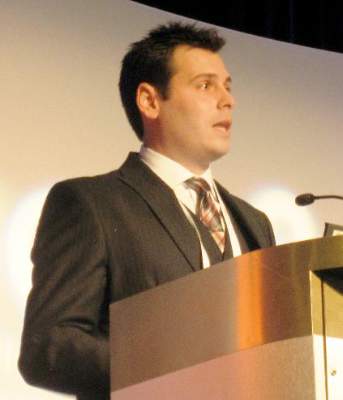AT ACTRIMS FORUM 2016
NEW ORLEANS (FRONTLINE MEDICAL NEWS) – Exercise can be beneficial in transiently improving cognitive impairment in people with multiple sclerosis.
Research presented at a meeting held by the Americas Committee for Treatment and Research in Multiple Sclerosis has extended the exercise benefit to cognitive impairment, as measured by reaction time in 24 subjects. The benefit, which was transient, also was evident in 14 subjects who were thermosensitive and displayed elevated core body temperature during exercise. Although preliminary, the data are sufficiently evocative to warrant randomized controlled trials (RCTs).
Cognitive impairment is prevalent in MS, being present in upward of 50% of affected individuals. Exercise may or may not be beneficial in cognitive improvement, given the inconsistent results from three RCTs that have been done. The different types of exercise used in the studies could be one reason for the uncertainty.
For people with MS who are fully ambulatory, treadmill walking could be the best form of exercise. But it’s not known how long and at what intensity someone should walk to realize any cognitive benefit. The investigators, led by Brian M. Sandroff, Ph.D., a postdoctoral fellow at the Kessler Foundation, West Orange, N.J., designed the study to assess these unknowns.
The study compared the influence of light, moderate, and vigorous treadmill walking on what is known as inhibitory control – a mental ability to react to stimuli. A period of quiet rest also was included prior to treadmill walking to assess the effects of no walking. The four conditions were tested in random order by the 24 participants with MS who had an Expanded Disability Status Scale (EDSS) score greater than or equal to 4, indicative of minimal or moderate disability. Prior to and soon after 20 minutes of treadmill walking, the reaction time of each participant was judged using a modified flanker task. The test requires a subject to respond to specific relevant information or ignore irrelevant information. The time for a correct response was the reaction time.
Light, moderate, and vigorous treadmill walking similarly and significantly improved reaction time, compared with quiet rest. To assess whether an increase in core body temperature might negate the exercise-related benefit, core body temperature was assessed in 14 thermosensitive MS patients (EDSS less than or equal to 4.0). Core body temperature was recorded every 10 seconds using an ingested sensor capsule and wireless data recorder during 20 minutes of vigorous treadmill exercise and 20 minutes of quiet rest. The core temperature of the subjects rose significantly by about 0.6° C during exercise. But this did not affect the exercise-related improved reaction time.
“There have been no published studies comparing the acute (transient) versus chronic effects of exercise on cognition in MS. We have hypothesized that the acute effects of single bouts of exercise on cognition will be both additive and cumulative over time, when delivered in a longitudinal intervention – much like the effects of a single bout of aerobic exercise on aerobic fitness. In this example, you get small, transient improvements in aerobic fitness after a single session of aerobic exercise; these small improvements add up with continued training, and eventually result in a meaningful improvement,” Dr. Sandroff said in an interview.
The researchers are planning an RCT on the longer-term effects of treadmill walking exercise training on cognition and brain structure/function.
The study was not funded by an external grant. Dr. Sandroff had no relevant financial disclosures.






